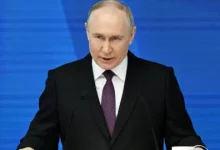
Tens of thousands of women in Iceland, including Prime Minister Katrín Jakobsdóttir, will refuse to work on Tuesday.
The “kvennafri”, or women’s day off, has been called in protest at the gender pay gap and gender-based violence.
Fields in which women are the majority of workers, such as healthcare and education, will be especially affected.
The planned walkout will mark the first full-day women’s strike since 1975.
Women and non-binary people have been urged to refuse paid and unpaid work on Tuesday, including household chores.
“I will not work this day, as I expect all the women (in cabinet) will do as well,” Iceland’s PM, Ms Jakobsdóttir, told the mbl.is website.
Ms Jakobsdóttir said her government is looking into how female-dominated professions are valued, in comparison to fields traditionally dominated by men.
According to the Icelandic Teachers’ Union, women make up the majority of teachers at every level of the educational system, including 94% of kindergarten teachers.
Around 80% of workers at the National University Hospital of Iceland, the biggest in the country, are women.
Iceland has been ranked the best country in the world for gender equality by the World Economic Forum (WEF) for 14 years in a row. But the country is not completely equal, with the WEF assigning it an overall score of 91.2%.
The volcanic island, which is one of the most sparsely-populated countries, ranks 14th in the world for economic participation, below countries including Liberia, Jamaica and Norway.
Around 90% of the Iceland’s female population went on strike in 1975, seeking to highlight the importance of women to the economy. The strike prompted the country’s parliament to pass an equal pay law the following year.
Former Icelandic president, Vigdís Finnbogadóttir, told the BBC in 2015 that the 1975 strike was “the first step for women’s emancipation in Iceland,” which paved the way for her to become the first woman to be democratically elected head of state in the world in 1980. —BBC





